Independence, Reflection & Learning: Professional Practice I Report
VerifiedAdded on 2023/06/12
|16
|3961
|238
Report
AI Summary
This report reflects on the author's progression as a team player, analyzes learning styles using the Honey & Mumford model, and emphasizes the importance of self-marketing, particularly through LinkedIn. It includes a development needs analysis and personal development plan, highlighting the significance of self-reflection and continuous improvement for career success. The author discusses their journey within a team, focusing on increased confidence and improved communication skills. The report concludes with actionable steps for personal and professional development, including participation in teamwork and personality enhancement programs. Desklib provides access to similar solved assignments.
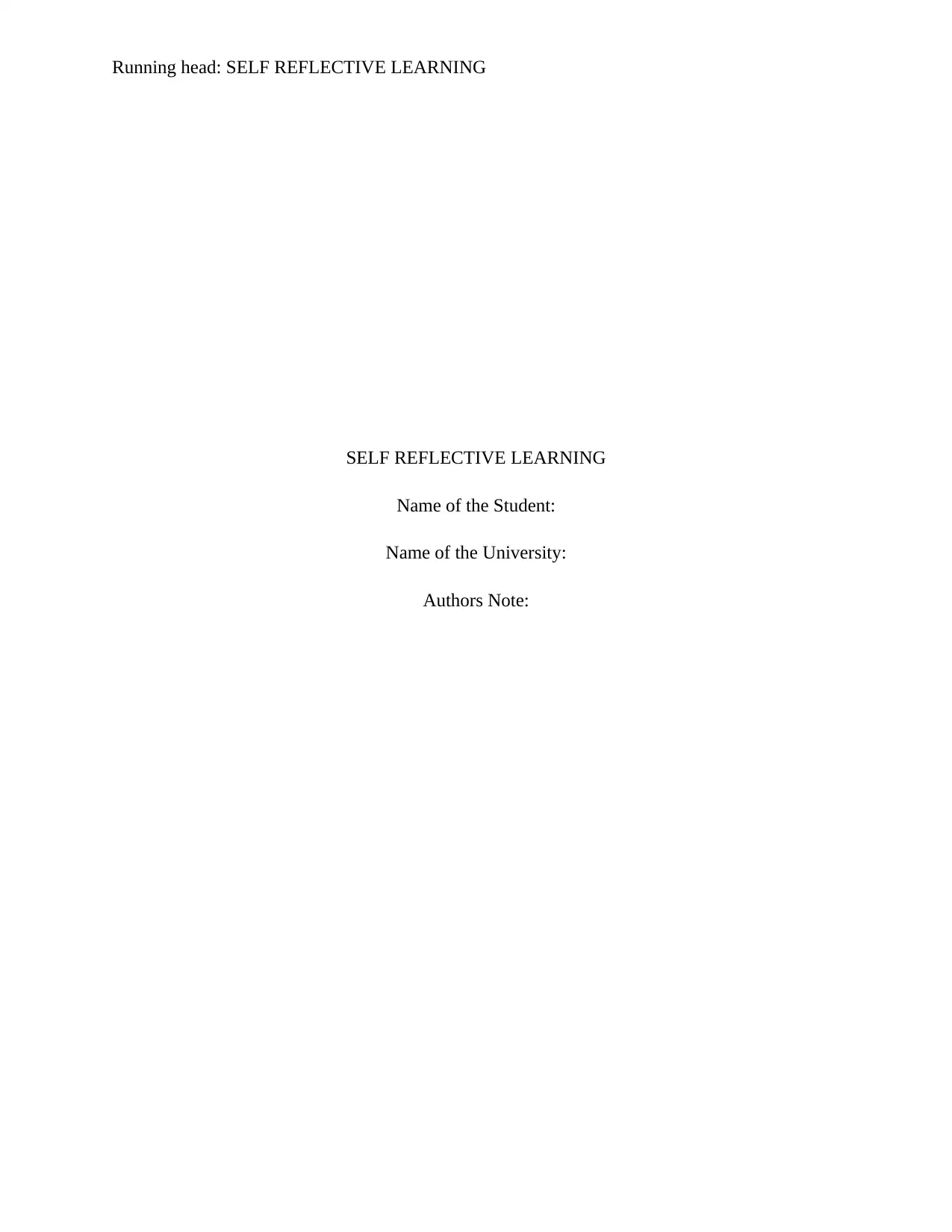
Running head: SELF REFLECTIVE LEARNING
SELF REFLECTIVE LEARNING
Name of the Student:
Name of the University:
Authors Note:
SELF REFLECTIVE LEARNING
Name of the Student:
Name of the University:
Authors Note:
Paraphrase This Document
Need a fresh take? Get an instant paraphrase of this document with our AI Paraphraser
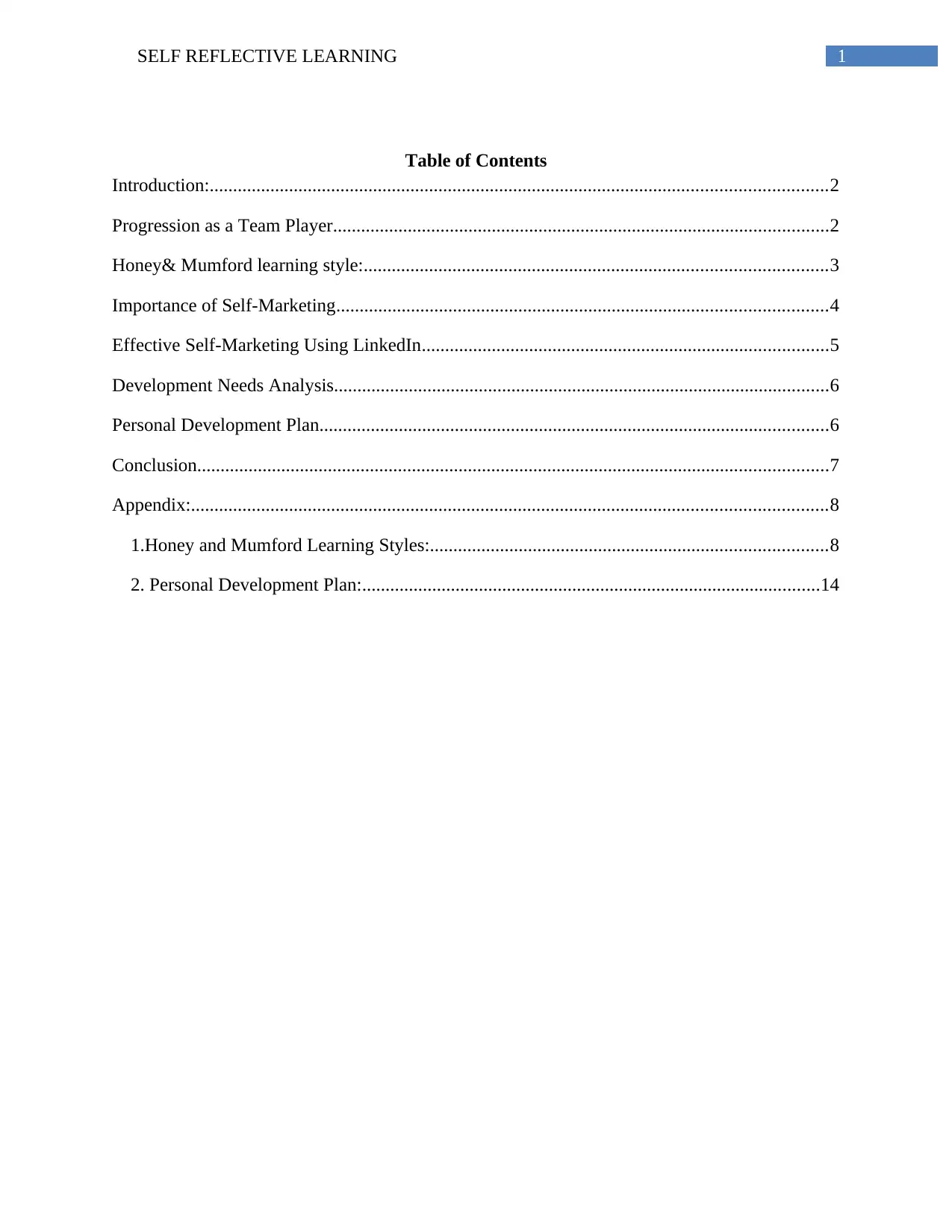
1SELF REFLECTIVE LEARNING
Table of Contents
Introduction:....................................................................................................................................2
Progression as a Team Player..........................................................................................................2
Honey& Mumford learning style:...................................................................................................3
Importance of Self-Marketing.........................................................................................................4
Effective Self-Marketing Using LinkedIn.......................................................................................5
Development Needs Analysis..........................................................................................................6
Personal Development Plan.............................................................................................................6
Conclusion.......................................................................................................................................7
Appendix:........................................................................................................................................8
1.Honey and Mumford Learning Styles:.....................................................................................8
2. Personal Development Plan:..................................................................................................14
Table of Contents
Introduction:....................................................................................................................................2
Progression as a Team Player..........................................................................................................2
Honey& Mumford learning style:...................................................................................................3
Importance of Self-Marketing.........................................................................................................4
Effective Self-Marketing Using LinkedIn.......................................................................................5
Development Needs Analysis..........................................................................................................6
Personal Development Plan.............................................................................................................6
Conclusion.......................................................................................................................................7
Appendix:........................................................................................................................................8
1.Honey and Mumford Learning Styles:.....................................................................................8
2. Personal Development Plan:..................................................................................................14
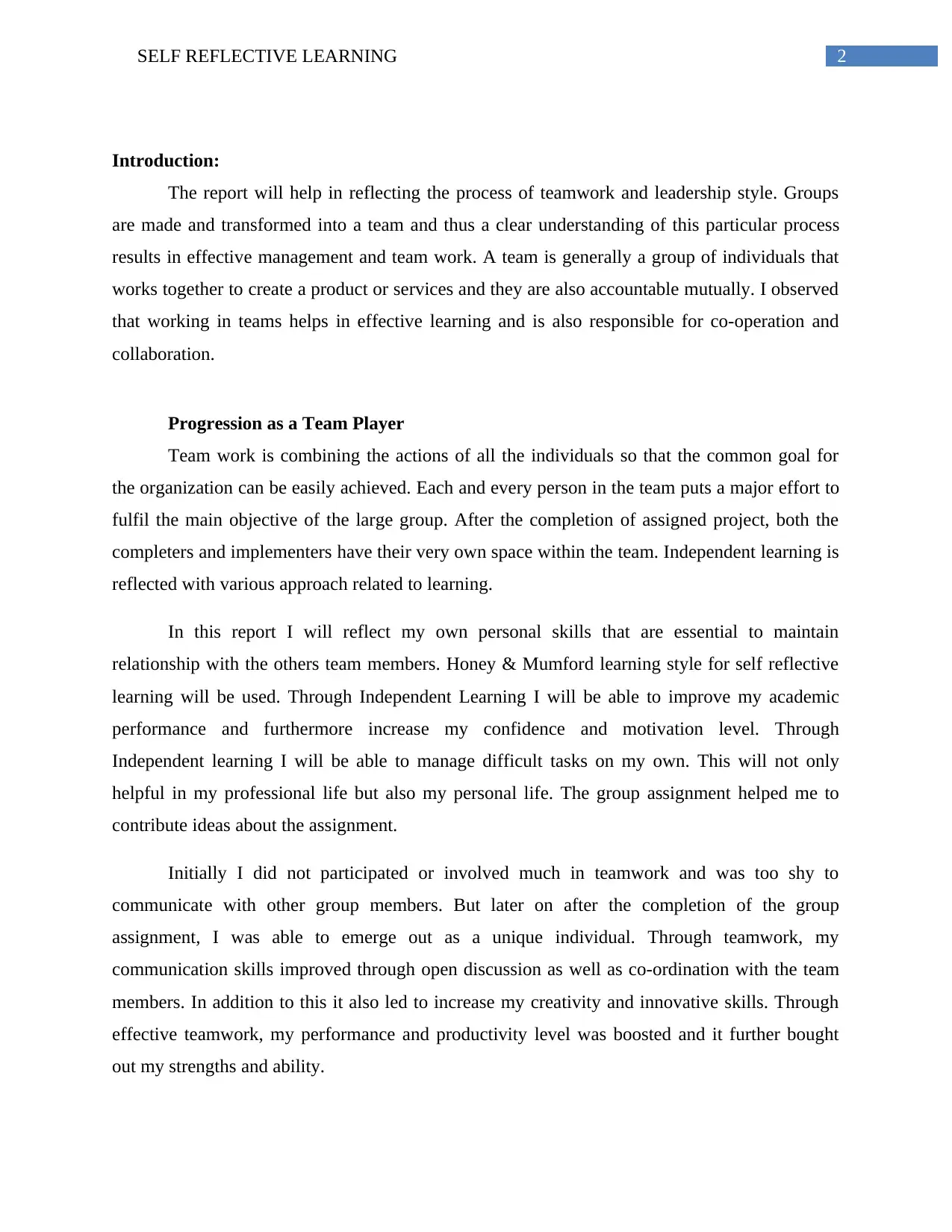
2SELF REFLECTIVE LEARNING
Introduction:
The report will help in reflecting the process of teamwork and leadership style. Groups
are made and transformed into a team and thus a clear understanding of this particular process
results in effective management and team work. A team is generally a group of individuals that
works together to create a product or services and they are also accountable mutually. I observed
that working in teams helps in effective learning and is also responsible for co-operation and
collaboration.
Progression as a Team Player
Team work is combining the actions of all the individuals so that the common goal for
the organization can be easily achieved. Each and every person in the team puts a major effort to
fulfil the main objective of the large group. After the completion of assigned project, both the
completers and implementers have their very own space within the team. Independent learning is
reflected with various approach related to learning.
In this report I will reflect my own personal skills that are essential to maintain
relationship with the others team members. Honey & Mumford learning style for self reflective
learning will be used. Through Independent Learning I will be able to improve my academic
performance and furthermore increase my confidence and motivation level. Through
Independent learning I will be able to manage difficult tasks on my own. This will not only
helpful in my professional life but also my personal life. The group assignment helped me to
contribute ideas about the assignment.
Initially I did not participated or involved much in teamwork and was too shy to
communicate with other group members. But later on after the completion of the group
assignment, I was able to emerge out as a unique individual. Through teamwork, my
communication skills improved through open discussion as well as co-ordination with the team
members. In addition to this it also led to increase my creativity and innovative skills. Through
effective teamwork, my performance and productivity level was boosted and it further bought
out my strengths and ability.
Introduction:
The report will help in reflecting the process of teamwork and leadership style. Groups
are made and transformed into a team and thus a clear understanding of this particular process
results in effective management and team work. A team is generally a group of individuals that
works together to create a product or services and they are also accountable mutually. I observed
that working in teams helps in effective learning and is also responsible for co-operation and
collaboration.
Progression as a Team Player
Team work is combining the actions of all the individuals so that the common goal for
the organization can be easily achieved. Each and every person in the team puts a major effort to
fulfil the main objective of the large group. After the completion of assigned project, both the
completers and implementers have their very own space within the team. Independent learning is
reflected with various approach related to learning.
In this report I will reflect my own personal skills that are essential to maintain
relationship with the others team members. Honey & Mumford learning style for self reflective
learning will be used. Through Independent Learning I will be able to improve my academic
performance and furthermore increase my confidence and motivation level. Through
Independent learning I will be able to manage difficult tasks on my own. This will not only
helpful in my professional life but also my personal life. The group assignment helped me to
contribute ideas about the assignment.
Initially I did not participated or involved much in teamwork and was too shy to
communicate with other group members. But later on after the completion of the group
assignment, I was able to emerge out as a unique individual. Through teamwork, my
communication skills improved through open discussion as well as co-ordination with the team
members. In addition to this it also led to increase my creativity and innovative skills. Through
effective teamwork, my performance and productivity level was boosted and it further bought
out my strengths and ability.
⊘ This is a preview!⊘
Do you want full access?
Subscribe today to unlock all pages.

Trusted by 1+ million students worldwide
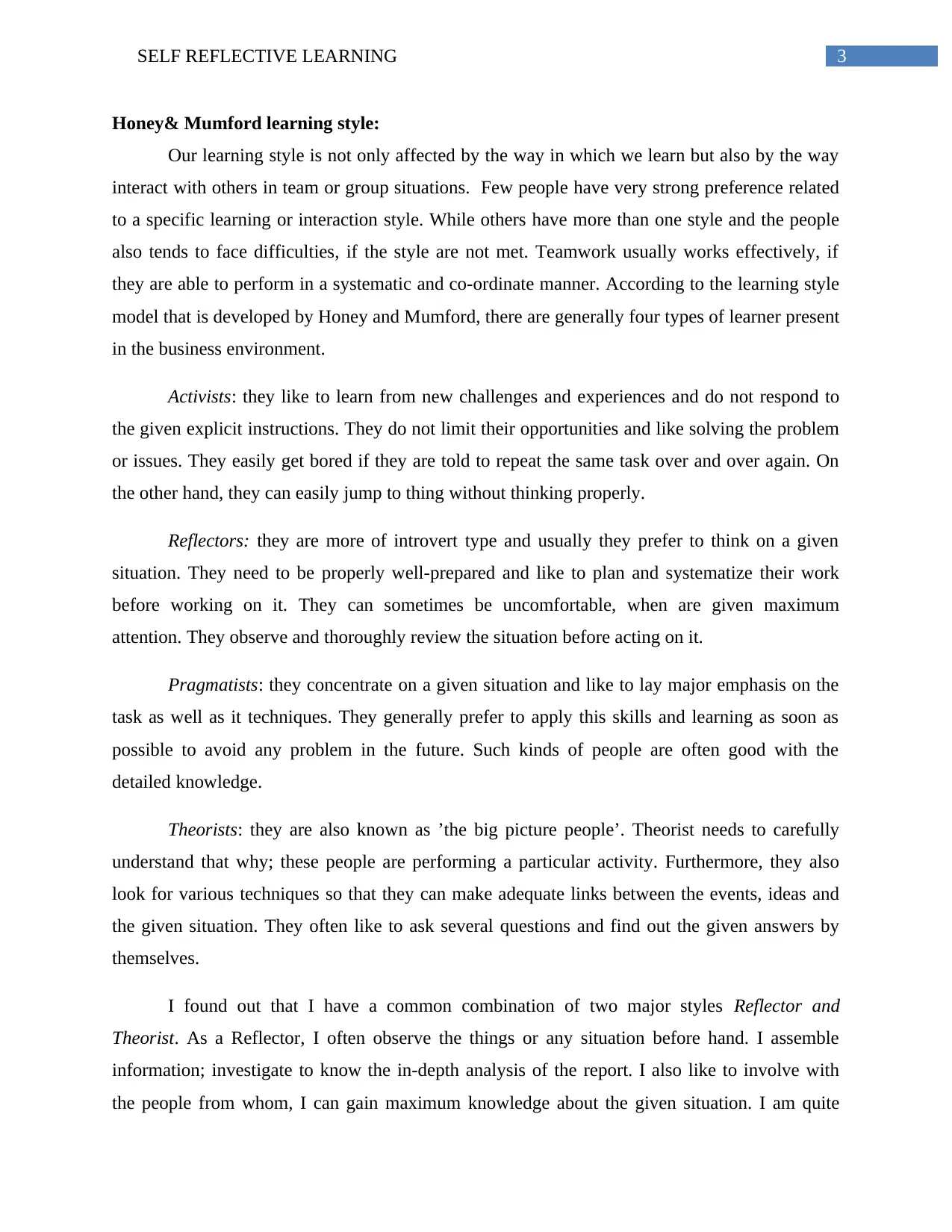
3SELF REFLECTIVE LEARNING
Honey& Mumford learning style:
Our learning style is not only affected by the way in which we learn but also by the way
interact with others in team or group situations. Few people have very strong preference related
to a specific learning or interaction style. While others have more than one style and the people
also tends to face difficulties, if the style are not met. Teamwork usually works effectively, if
they are able to perform in a systematic and co-ordinate manner. According to the learning style
model that is developed by Honey and Mumford, there are generally four types of learner present
in the business environment.
Activists: they like to learn from new challenges and experiences and do not respond to
the given explicit instructions. They do not limit their opportunities and like solving the problem
or issues. They easily get bored if they are told to repeat the same task over and over again. On
the other hand, they can easily jump to thing without thinking properly.
Reflectors: they are more of introvert type and usually they prefer to think on a given
situation. They need to be properly well-prepared and like to plan and systematize their work
before working on it. They can sometimes be uncomfortable, when are given maximum
attention. They observe and thoroughly review the situation before acting on it.
Pragmatists: they concentrate on a given situation and like to lay major emphasis on the
task as well as it techniques. They generally prefer to apply this skills and learning as soon as
possible to avoid any problem in the future. Such kinds of people are often good with the
detailed knowledge.
Theorists: they are also known as ’the big picture people’. Theorist needs to carefully
understand that why; these people are performing a particular activity. Furthermore, they also
look for various techniques so that they can make adequate links between the events, ideas and
the given situation. They often like to ask several questions and find out the given answers by
themselves.
I found out that I have a common combination of two major styles Reflector and
Theorist. As a Reflector, I often observe the things or any situation before hand. I assemble
information; investigate to know the in-depth analysis of the report. I also like to involve with
the people from whom, I can gain maximum knowledge about the given situation. I am quite
Honey& Mumford learning style:
Our learning style is not only affected by the way in which we learn but also by the way
interact with others in team or group situations. Few people have very strong preference related
to a specific learning or interaction style. While others have more than one style and the people
also tends to face difficulties, if the style are not met. Teamwork usually works effectively, if
they are able to perform in a systematic and co-ordinate manner. According to the learning style
model that is developed by Honey and Mumford, there are generally four types of learner present
in the business environment.
Activists: they like to learn from new challenges and experiences and do not respond to
the given explicit instructions. They do not limit their opportunities and like solving the problem
or issues. They easily get bored if they are told to repeat the same task over and over again. On
the other hand, they can easily jump to thing without thinking properly.
Reflectors: they are more of introvert type and usually they prefer to think on a given
situation. They need to be properly well-prepared and like to plan and systematize their work
before working on it. They can sometimes be uncomfortable, when are given maximum
attention. They observe and thoroughly review the situation before acting on it.
Pragmatists: they concentrate on a given situation and like to lay major emphasis on the
task as well as it techniques. They generally prefer to apply this skills and learning as soon as
possible to avoid any problem in the future. Such kinds of people are often good with the
detailed knowledge.
Theorists: they are also known as ’the big picture people’. Theorist needs to carefully
understand that why; these people are performing a particular activity. Furthermore, they also
look for various techniques so that they can make adequate links between the events, ideas and
the given situation. They often like to ask several questions and find out the given answers by
themselves.
I found out that I have a common combination of two major styles Reflector and
Theorist. As a Reflector, I often observe the things or any situation before hand. I assemble
information; investigate to know the in-depth analysis of the report. I also like to involve with
the people from whom, I can gain maximum knowledge about the given situation. I am quite
Paraphrase This Document
Need a fresh take? Get an instant paraphrase of this document with our AI Paraphraser
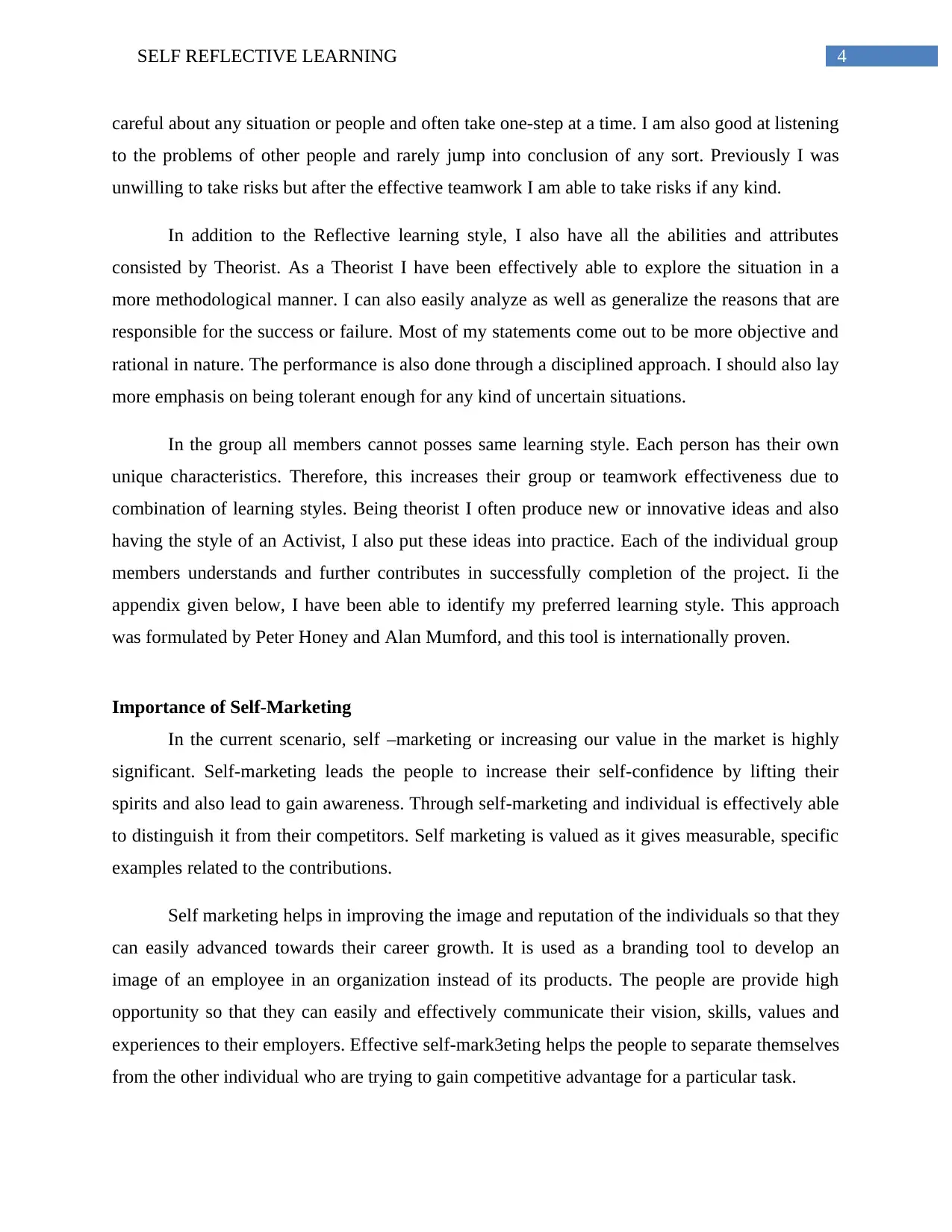
4SELF REFLECTIVE LEARNING
careful about any situation or people and often take one-step at a time. I am also good at listening
to the problems of other people and rarely jump into conclusion of any sort. Previously I was
unwilling to take risks but after the effective teamwork I am able to take risks if any kind.
In addition to the Reflective learning style, I also have all the abilities and attributes
consisted by Theorist. As a Theorist I have been effectively able to explore the situation in a
more methodological manner. I can also easily analyze as well as generalize the reasons that are
responsible for the success or failure. Most of my statements come out to be more objective and
rational in nature. The performance is also done through a disciplined approach. I should also lay
more emphasis on being tolerant enough for any kind of uncertain situations.
In the group all members cannot posses same learning style. Each person has their own
unique characteristics. Therefore, this increases their group or teamwork effectiveness due to
combination of learning styles. Being theorist I often produce new or innovative ideas and also
having the style of an Activist, I also put these ideas into practice. Each of the individual group
members understands and further contributes in successfully completion of the project. Ii the
appendix given below, I have been able to identify my preferred learning style. This approach
was formulated by Peter Honey and Alan Mumford, and this tool is internationally proven.
Importance of Self-Marketing
In the current scenario, self –marketing or increasing our value in the market is highly
significant. Self-marketing leads the people to increase their self-confidence by lifting their
spirits and also lead to gain awareness. Through self-marketing and individual is effectively able
to distinguish it from their competitors. Self marketing is valued as it gives measurable, specific
examples related to the contributions.
Self marketing helps in improving the image and reputation of the individuals so that they
can easily advanced towards their career growth. It is used as a branding tool to develop an
image of an employee in an organization instead of its products. The people are provide high
opportunity so that they can easily and effectively communicate their vision, skills, values and
experiences to their employers. Effective self-mark3eting helps the people to separate themselves
from the other individual who are trying to gain competitive advantage for a particular task.
careful about any situation or people and often take one-step at a time. I am also good at listening
to the problems of other people and rarely jump into conclusion of any sort. Previously I was
unwilling to take risks but after the effective teamwork I am able to take risks if any kind.
In addition to the Reflective learning style, I also have all the abilities and attributes
consisted by Theorist. As a Theorist I have been effectively able to explore the situation in a
more methodological manner. I can also easily analyze as well as generalize the reasons that are
responsible for the success or failure. Most of my statements come out to be more objective and
rational in nature. The performance is also done through a disciplined approach. I should also lay
more emphasis on being tolerant enough for any kind of uncertain situations.
In the group all members cannot posses same learning style. Each person has their own
unique characteristics. Therefore, this increases their group or teamwork effectiveness due to
combination of learning styles. Being theorist I often produce new or innovative ideas and also
having the style of an Activist, I also put these ideas into practice. Each of the individual group
members understands and further contributes in successfully completion of the project. Ii the
appendix given below, I have been able to identify my preferred learning style. This approach
was formulated by Peter Honey and Alan Mumford, and this tool is internationally proven.
Importance of Self-Marketing
In the current scenario, self –marketing or increasing our value in the market is highly
significant. Self-marketing leads the people to increase their self-confidence by lifting their
spirits and also lead to gain awareness. Through self-marketing and individual is effectively able
to distinguish it from their competitors. Self marketing is valued as it gives measurable, specific
examples related to the contributions.
Self marketing helps in improving the image and reputation of the individuals so that they
can easily advanced towards their career growth. It is used as a branding tool to develop an
image of an employee in an organization instead of its products. The people are provide high
opportunity so that they can easily and effectively communicate their vision, skills, values and
experiences to their employers. Effective self-mark3eting helps the people to separate themselves
from the other individual who are trying to gain competitive advantage for a particular task.
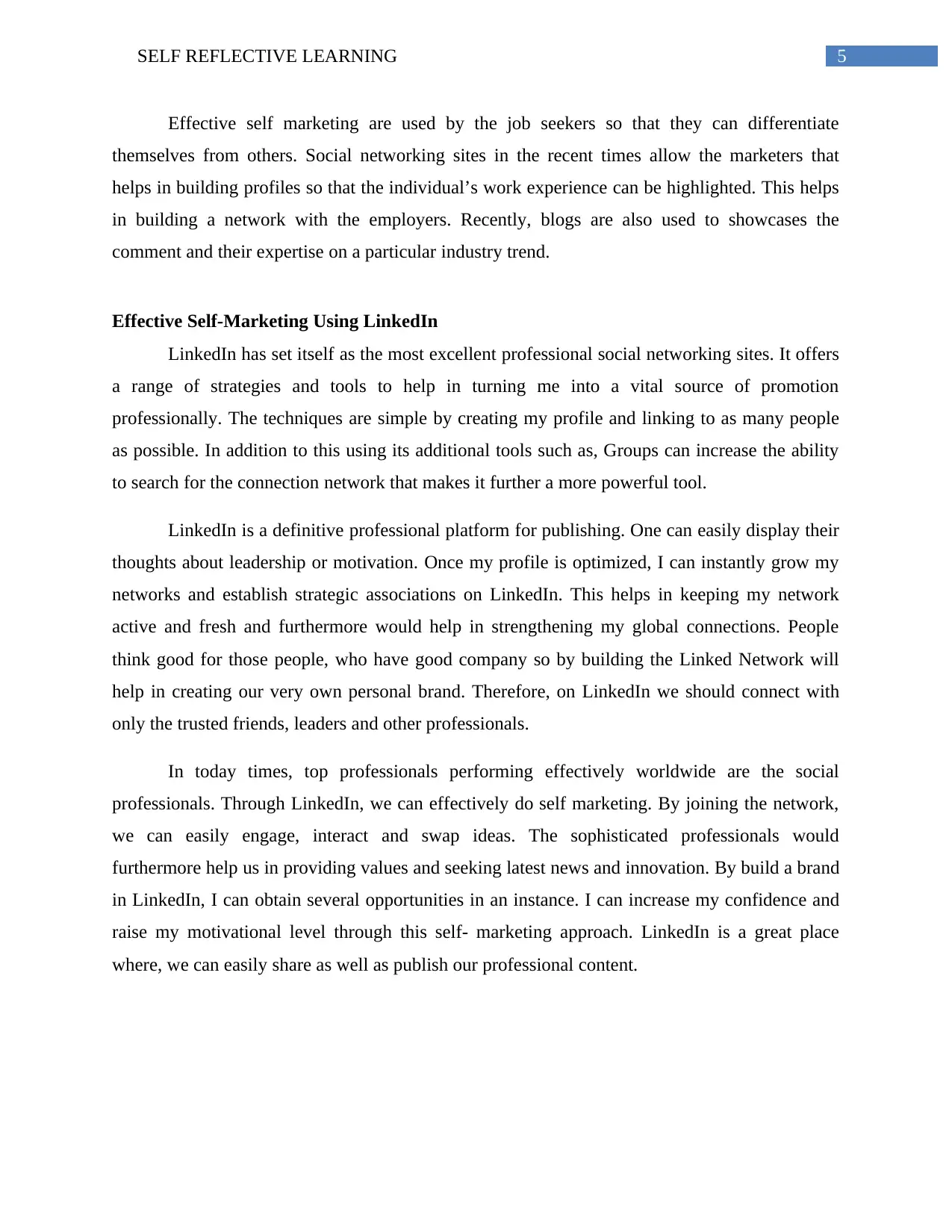
5SELF REFLECTIVE LEARNING
Effective self marketing are used by the job seekers so that they can differentiate
themselves from others. Social networking sites in the recent times allow the marketers that
helps in building profiles so that the individual’s work experience can be highlighted. This helps
in building a network with the employers. Recently, blogs are also used to showcases the
comment and their expertise on a particular industry trend.
Effective Self-Marketing Using LinkedIn
LinkedIn has set itself as the most excellent professional social networking sites. It offers
a range of strategies and tools to help in turning me into a vital source of promotion
professionally. The techniques are simple by creating my profile and linking to as many people
as possible. In addition to this using its additional tools such as, Groups can increase the ability
to search for the connection network that makes it further a more powerful tool.
LinkedIn is a definitive professional platform for publishing. One can easily display their
thoughts about leadership or motivation. Once my profile is optimized, I can instantly grow my
networks and establish strategic associations on LinkedIn. This helps in keeping my network
active and fresh and furthermore would help in strengthening my global connections. People
think good for those people, who have good company so by building the Linked Network will
help in creating our very own personal brand. Therefore, on LinkedIn we should connect with
only the trusted friends, leaders and other professionals.
In today times, top professionals performing effectively worldwide are the social
professionals. Through LinkedIn, we can effectively do self marketing. By joining the network,
we can easily engage, interact and swap ideas. The sophisticated professionals would
furthermore help us in providing values and seeking latest news and innovation. By build a brand
in LinkedIn, I can obtain several opportunities in an instance. I can increase my confidence and
raise my motivational level through this self- marketing approach. LinkedIn is a great place
where, we can easily share as well as publish our professional content.
Effective self marketing are used by the job seekers so that they can differentiate
themselves from others. Social networking sites in the recent times allow the marketers that
helps in building profiles so that the individual’s work experience can be highlighted. This helps
in building a network with the employers. Recently, blogs are also used to showcases the
comment and their expertise on a particular industry trend.
Effective Self-Marketing Using LinkedIn
LinkedIn has set itself as the most excellent professional social networking sites. It offers
a range of strategies and tools to help in turning me into a vital source of promotion
professionally. The techniques are simple by creating my profile and linking to as many people
as possible. In addition to this using its additional tools such as, Groups can increase the ability
to search for the connection network that makes it further a more powerful tool.
LinkedIn is a definitive professional platform for publishing. One can easily display their
thoughts about leadership or motivation. Once my profile is optimized, I can instantly grow my
networks and establish strategic associations on LinkedIn. This helps in keeping my network
active and fresh and furthermore would help in strengthening my global connections. People
think good for those people, who have good company so by building the Linked Network will
help in creating our very own personal brand. Therefore, on LinkedIn we should connect with
only the trusted friends, leaders and other professionals.
In today times, top professionals performing effectively worldwide are the social
professionals. Through LinkedIn, we can effectively do self marketing. By joining the network,
we can easily engage, interact and swap ideas. The sophisticated professionals would
furthermore help us in providing values and seeking latest news and innovation. By build a brand
in LinkedIn, I can obtain several opportunities in an instance. I can increase my confidence and
raise my motivational level through this self- marketing approach. LinkedIn is a great place
where, we can easily share as well as publish our professional content.
⊘ This is a preview!⊘
Do you want full access?
Subscribe today to unlock all pages.

Trusted by 1+ million students worldwide
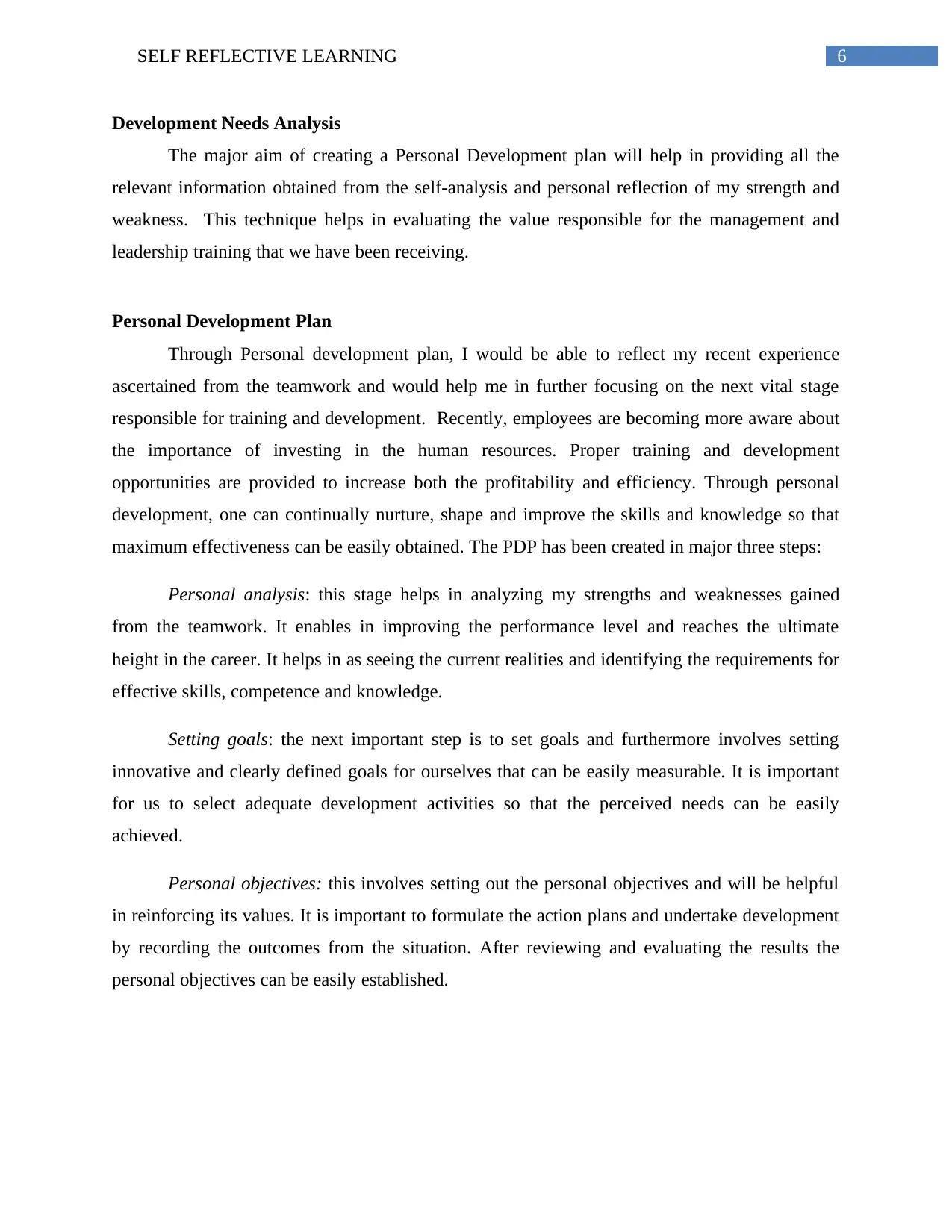
6SELF REFLECTIVE LEARNING
Development Needs Analysis
The major aim of creating a Personal Development plan will help in providing all the
relevant information obtained from the self-analysis and personal reflection of my strength and
weakness. This technique helps in evaluating the value responsible for the management and
leadership training that we have been receiving.
Personal Development Plan
Through Personal development plan, I would be able to reflect my recent experience
ascertained from the teamwork and would help me in further focusing on the next vital stage
responsible for training and development. Recently, employees are becoming more aware about
the importance of investing in the human resources. Proper training and development
opportunities are provided to increase both the profitability and efficiency. Through personal
development, one can continually nurture, shape and improve the skills and knowledge so that
maximum effectiveness can be easily obtained. The PDP has been created in major three steps:
Personal analysis: this stage helps in analyzing my strengths and weaknesses gained
from the teamwork. It enables in improving the performance level and reaches the ultimate
height in the career. It helps in as seeing the current realities and identifying the requirements for
effective skills, competence and knowledge.
Setting goals: the next important step is to set goals and furthermore involves setting
innovative and clearly defined goals for ourselves that can be easily measurable. It is important
for us to select adequate development activities so that the perceived needs can be easily
achieved.
Personal objectives: this involves setting out the personal objectives and will be helpful
in reinforcing its values. It is important to formulate the action plans and undertake development
by recording the outcomes from the situation. After reviewing and evaluating the results the
personal objectives can be easily established.
Development Needs Analysis
The major aim of creating a Personal Development plan will help in providing all the
relevant information obtained from the self-analysis and personal reflection of my strength and
weakness. This technique helps in evaluating the value responsible for the management and
leadership training that we have been receiving.
Personal Development Plan
Through Personal development plan, I would be able to reflect my recent experience
ascertained from the teamwork and would help me in further focusing on the next vital stage
responsible for training and development. Recently, employees are becoming more aware about
the importance of investing in the human resources. Proper training and development
opportunities are provided to increase both the profitability and efficiency. Through personal
development, one can continually nurture, shape and improve the skills and knowledge so that
maximum effectiveness can be easily obtained. The PDP has been created in major three steps:
Personal analysis: this stage helps in analyzing my strengths and weaknesses gained
from the teamwork. It enables in improving the performance level and reaches the ultimate
height in the career. It helps in as seeing the current realities and identifying the requirements for
effective skills, competence and knowledge.
Setting goals: the next important step is to set goals and furthermore involves setting
innovative and clearly defined goals for ourselves that can be easily measurable. It is important
for us to select adequate development activities so that the perceived needs can be easily
achieved.
Personal objectives: this involves setting out the personal objectives and will be helpful
in reinforcing its values. It is important to formulate the action plans and undertake development
by recording the outcomes from the situation. After reviewing and evaluating the results the
personal objectives can be easily established.
Paraphrase This Document
Need a fresh take? Get an instant paraphrase of this document with our AI Paraphraser
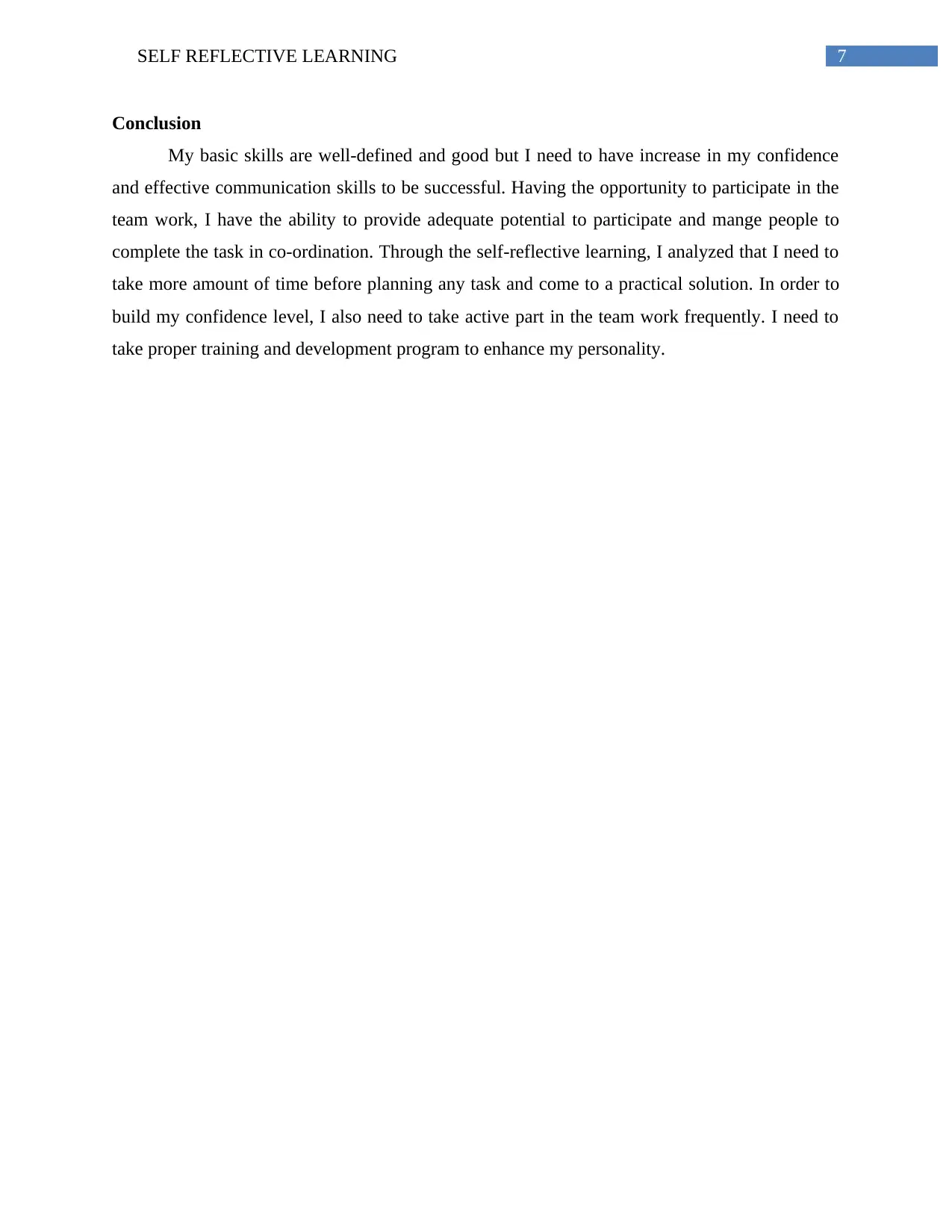
7SELF REFLECTIVE LEARNING
Conclusion
My basic skills are well-defined and good but I need to have increase in my confidence
and effective communication skills to be successful. Having the opportunity to participate in the
team work, I have the ability to provide adequate potential to participate and mange people to
complete the task in co-ordination. Through the self-reflective learning, I analyzed that I need to
take more amount of time before planning any task and come to a practical solution. In order to
build my confidence level, I also need to take active part in the team work frequently. I need to
take proper training and development program to enhance my personality.
Conclusion
My basic skills are well-defined and good but I need to have increase in my confidence
and effective communication skills to be successful. Having the opportunity to participate in the
team work, I have the ability to provide adequate potential to participate and mange people to
complete the task in co-ordination. Through the self-reflective learning, I analyzed that I need to
take more amount of time before planning any task and come to a practical solution. In order to
build my confidence level, I also need to take active part in the team work frequently. I need to
take proper training and development program to enhance my personality.
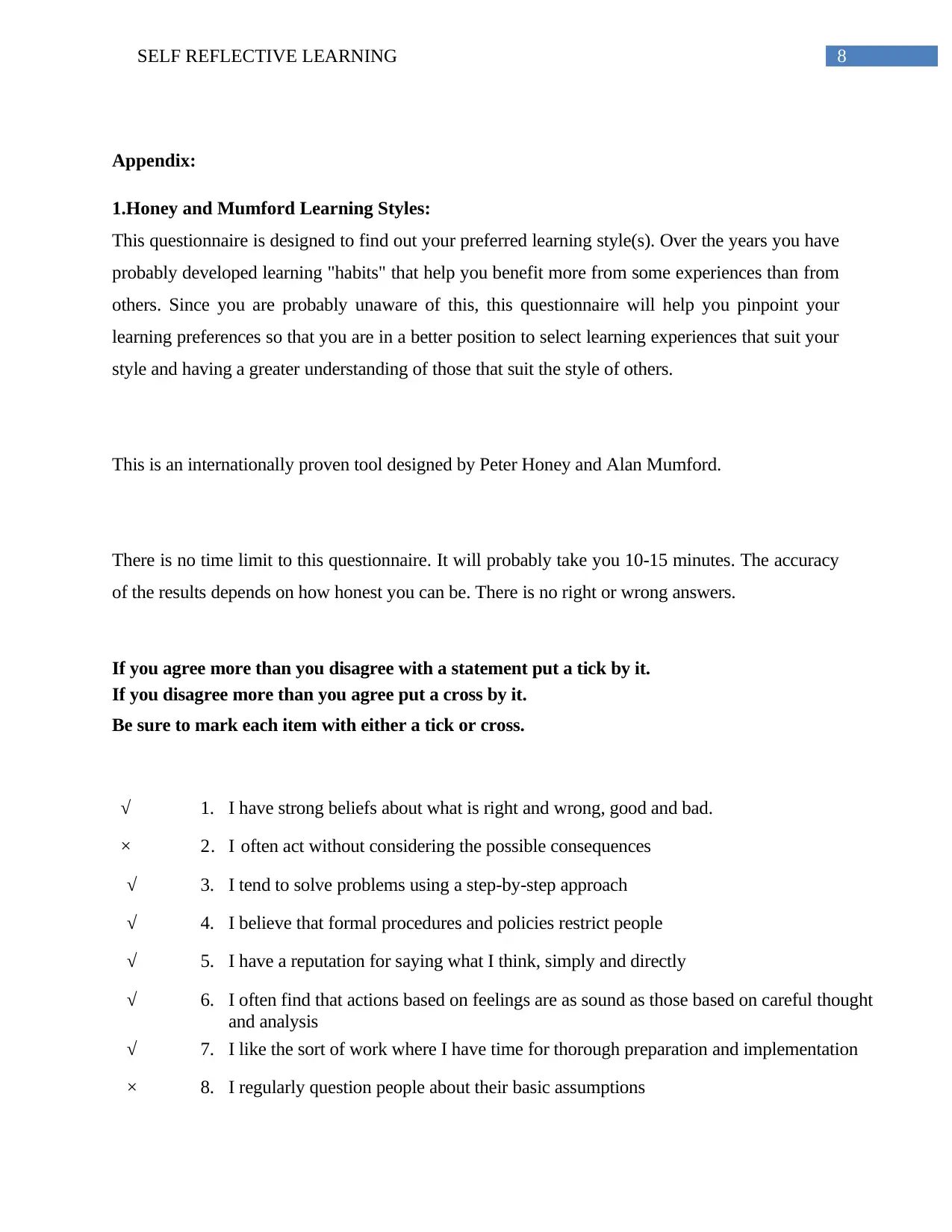
8SELF REFLECTIVE LEARNING
Appendix:
1.Honey and Mumford Learning Styles:
This questionnaire is designed to find out your preferred learning style(s). Over the years you have
probably developed learning "habits" that help you benefit more from some experiences than from
others. Since you are probably unaware of this, this questionnaire will help you pinpoint your
learning preferences so that you are in a better position to select learning experiences that suit your
style and having a greater understanding of those that suit the style of others.
This is an internationally proven tool designed by Peter Honey and Alan Mumford.
There is no time limit to this questionnaire. It will probably take you 10-15 minutes. The accuracy
of the results depends on how honest you can be. There is no right or wrong answers.
If you agree more than you disagree with a statement put a tick by it.
If you disagree more than you agree put a cross by it.
Be sure to mark each item with either a tick or cross.
√ 1. I have strong beliefs about what is right and wrong, good and bad.
× 2. I often act without considering the possible consequences
√ 3. I tend to solve problems using a step-by-step approach
√ 4. I believe that formal procedures and policies restrict people
√ 5. I have a reputation for saying what I think, simply and directly
√ 6. I often find that actions based on feelings are as sound as those based on careful thought
and analysis
√ 7. I like the sort of work where I have time for thorough preparation and implementation
× 8. I regularly question people about their basic assumptions
Appendix:
1.Honey and Mumford Learning Styles:
This questionnaire is designed to find out your preferred learning style(s). Over the years you have
probably developed learning "habits" that help you benefit more from some experiences than from
others. Since you are probably unaware of this, this questionnaire will help you pinpoint your
learning preferences so that you are in a better position to select learning experiences that suit your
style and having a greater understanding of those that suit the style of others.
This is an internationally proven tool designed by Peter Honey and Alan Mumford.
There is no time limit to this questionnaire. It will probably take you 10-15 minutes. The accuracy
of the results depends on how honest you can be. There is no right or wrong answers.
If you agree more than you disagree with a statement put a tick by it.
If you disagree more than you agree put a cross by it.
Be sure to mark each item with either a tick or cross.
√ 1. I have strong beliefs about what is right and wrong, good and bad.
× 2. I often act without considering the possible consequences
√ 3. I tend to solve problems using a step-by-step approach
√ 4. I believe that formal procedures and policies restrict people
√ 5. I have a reputation for saying what I think, simply and directly
√ 6. I often find that actions based on feelings are as sound as those based on careful thought
and analysis
√ 7. I like the sort of work where I have time for thorough preparation and implementation
× 8. I regularly question people about their basic assumptions
⊘ This is a preview!⊘
Do you want full access?
Subscribe today to unlock all pages.

Trusted by 1+ million students worldwide
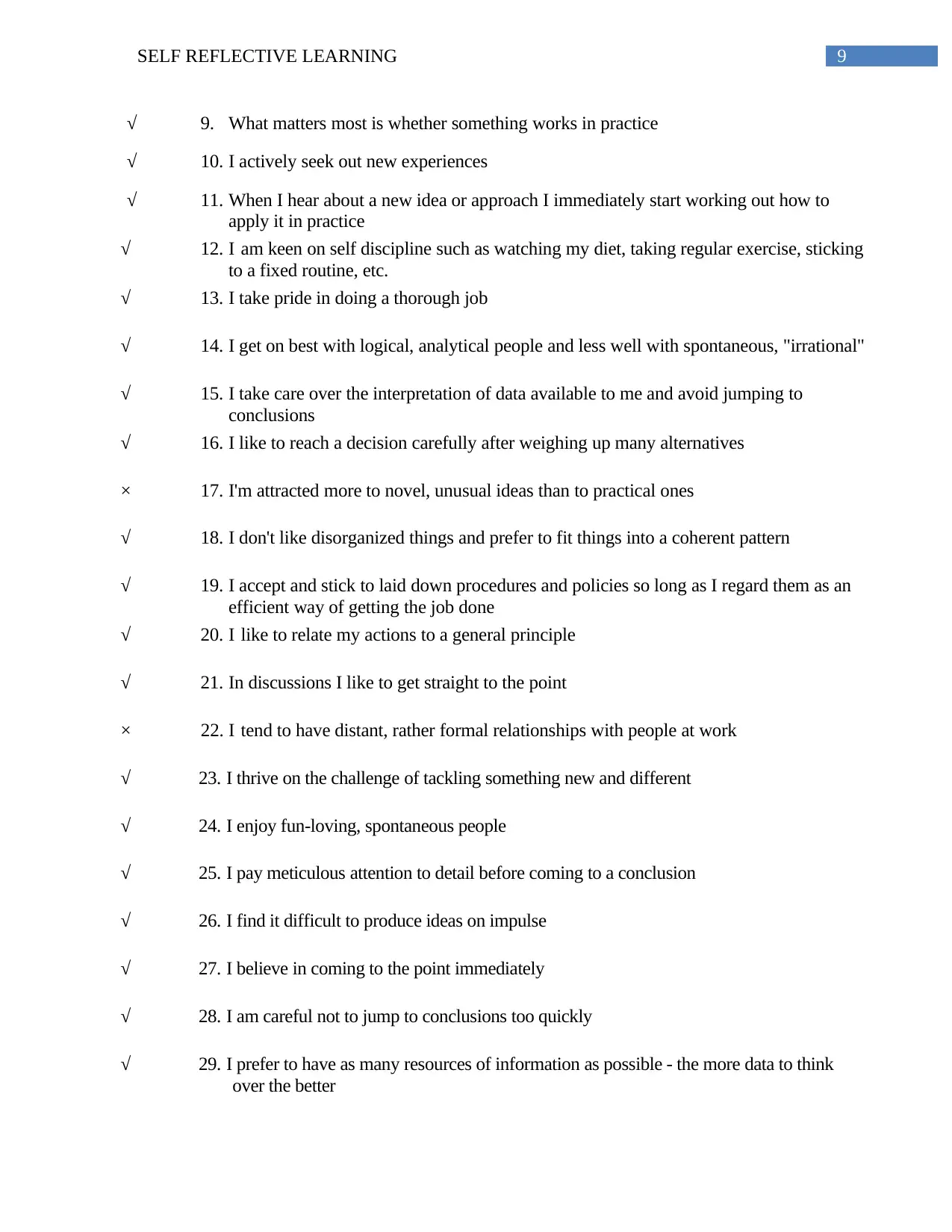
9SELF REFLECTIVE LEARNING
√ 9. What matters most is whether something works in practice
√ 10. I actively seek out new experiences
√ 11. When I hear about a new idea or approach I immediately start working out how to
apply it in practice
√ 12. I am keen on self discipline such as watching my diet, taking regular exercise, sticking
to a fixed routine, etc.
√ 13. I take pride in doing a thorough job
√ 14. I get on best with logical, analytical people and less well with spontaneous, "irrational"
√ 15. I take care over the interpretation of data available to me and avoid jumping to
conclusions
√ 16. I like to reach a decision carefully after weighing up many alternatives
× 17. I'm attracted more to novel, unusual ideas than to practical ones
√ 18. I don't like disorganized things and prefer to fit things into a coherent pattern
√ 19. I accept and stick to laid down procedures and policies so long as I regard them as an
efficient way of getting the job done
√ 20. I like to relate my actions to a general principle
√ 21. In discussions I like to get straight to the point
× 22. I tend to have distant, rather formal relationships with people at work
√ 23. I thrive on the challenge of tackling something new and different
√ 24. I enjoy fun-loving, spontaneous people
√ 25. I pay meticulous attention to detail before coming to a conclusion
√ 26. I find it difficult to produce ideas on impulse
√ 27. I believe in coming to the point immediately
√ 28. I am careful not to jump to conclusions too quickly
√ 29. I prefer to have as many resources of information as possible - the more data to think
over the better
√ 9. What matters most is whether something works in practice
√ 10. I actively seek out new experiences
√ 11. When I hear about a new idea or approach I immediately start working out how to
apply it in practice
√ 12. I am keen on self discipline such as watching my diet, taking regular exercise, sticking
to a fixed routine, etc.
√ 13. I take pride in doing a thorough job
√ 14. I get on best with logical, analytical people and less well with spontaneous, "irrational"
√ 15. I take care over the interpretation of data available to me and avoid jumping to
conclusions
√ 16. I like to reach a decision carefully after weighing up many alternatives
× 17. I'm attracted more to novel, unusual ideas than to practical ones
√ 18. I don't like disorganized things and prefer to fit things into a coherent pattern
√ 19. I accept and stick to laid down procedures and policies so long as I regard them as an
efficient way of getting the job done
√ 20. I like to relate my actions to a general principle
√ 21. In discussions I like to get straight to the point
× 22. I tend to have distant, rather formal relationships with people at work
√ 23. I thrive on the challenge of tackling something new and different
√ 24. I enjoy fun-loving, spontaneous people
√ 25. I pay meticulous attention to detail before coming to a conclusion
√ 26. I find it difficult to produce ideas on impulse
√ 27. I believe in coming to the point immediately
√ 28. I am careful not to jump to conclusions too quickly
√ 29. I prefer to have as many resources of information as possible - the more data to think
over the better
Paraphrase This Document
Need a fresh take? Get an instant paraphrase of this document with our AI Paraphraser
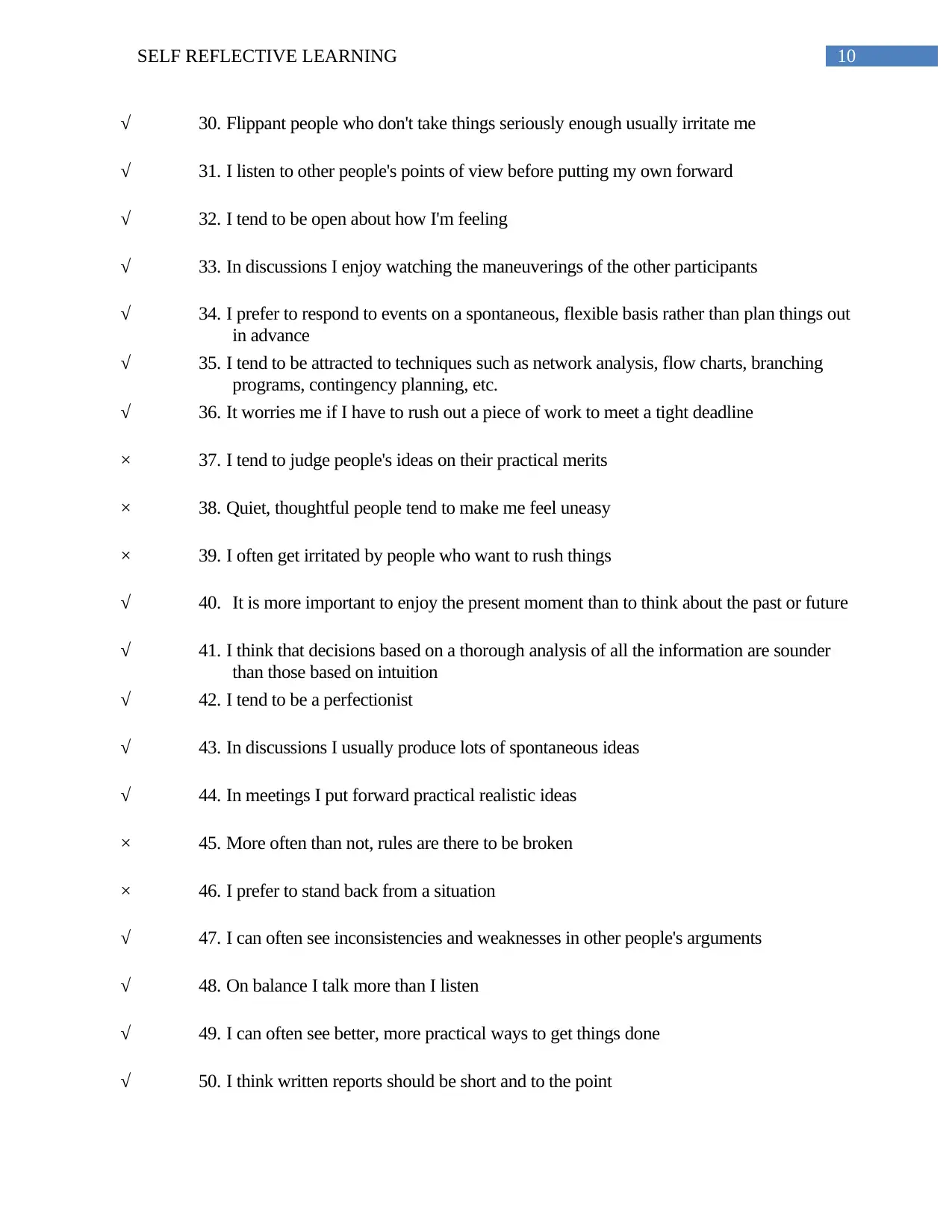
10SELF REFLECTIVE LEARNING
√ 30. Flippant people who don't take things seriously enough usually irritate me
√ 31. I listen to other people's points of view before putting my own forward
√ 32. I tend to be open about how I'm feeling
√ 33. In discussions I enjoy watching the maneuverings of the other participants
√ 34. I prefer to respond to events on a spontaneous, flexible basis rather than plan things out
in advance
√ 35. I tend to be attracted to techniques such as network analysis, flow charts, branching
programs, contingency planning, etc.
√ 36. It worries me if I have to rush out a piece of work to meet a tight deadline
× 37. I tend to judge people's ideas on their practical merits
× 38. Quiet, thoughtful people tend to make me feel uneasy
× 39. I often get irritated by people who want to rush things
√ 40. It is more important to enjoy the present moment than to think about the past or future
√ 41. I think that decisions based on a thorough analysis of all the information are sounder
than those based on intuition
√ 42. I tend to be a perfectionist
√ 43. In discussions I usually produce lots of spontaneous ideas
√ 44. In meetings I put forward practical realistic ideas
× 45. More often than not, rules are there to be broken
× 46. I prefer to stand back from a situation
√ 47. I can often see inconsistencies and weaknesses in other people's arguments
√ 48. On balance I talk more than I listen
√ 49. I can often see better, more practical ways to get things done
√ 50. I think written reports should be short and to the point
√ 30. Flippant people who don't take things seriously enough usually irritate me
√ 31. I listen to other people's points of view before putting my own forward
√ 32. I tend to be open about how I'm feeling
√ 33. In discussions I enjoy watching the maneuverings of the other participants
√ 34. I prefer to respond to events on a spontaneous, flexible basis rather than plan things out
in advance
√ 35. I tend to be attracted to techniques such as network analysis, flow charts, branching
programs, contingency planning, etc.
√ 36. It worries me if I have to rush out a piece of work to meet a tight deadline
× 37. I tend to judge people's ideas on their practical merits
× 38. Quiet, thoughtful people tend to make me feel uneasy
× 39. I often get irritated by people who want to rush things
√ 40. It is more important to enjoy the present moment than to think about the past or future
√ 41. I think that decisions based on a thorough analysis of all the information are sounder
than those based on intuition
√ 42. I tend to be a perfectionist
√ 43. In discussions I usually produce lots of spontaneous ideas
√ 44. In meetings I put forward practical realistic ideas
× 45. More often than not, rules are there to be broken
× 46. I prefer to stand back from a situation
√ 47. I can often see inconsistencies and weaknesses in other people's arguments
√ 48. On balance I talk more than I listen
√ 49. I can often see better, more practical ways to get things done
√ 50. I think written reports should be short and to the point
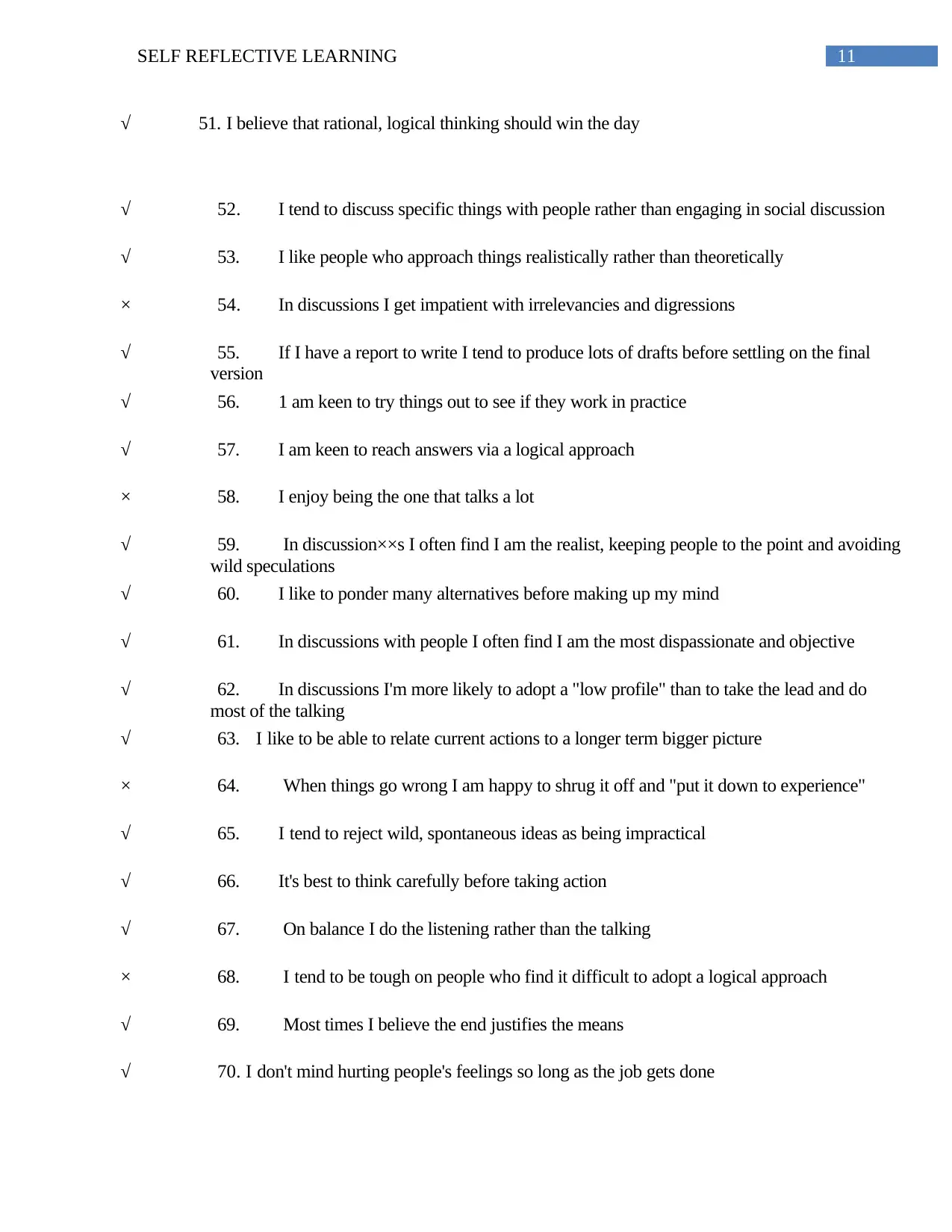
11SELF REFLECTIVE LEARNING
√ 51. I believe that rational, logical thinking should win the day
√ 52. I tend to discuss specific things with people rather than engaging in social discussion
√ 53. I like people who approach things realistically rather than theoretically
× 54. In discussions I get impatient with irrelevancies and digressions
√ 55. If I have a report to write I tend to produce lots of drafts before settling on the final
version
√ 56. 1 am keen to try things out to see if they work in practice
√ 57. I am keen to reach answers via a logical approach
× 58. I enjoy being the one that talks a lot
√ 59. In discussion××s I often find I am the realist, keeping people to the point and avoiding
wild speculations
√ 60. I like to ponder many alternatives before making up my mind
√ 61. In discussions with people I often find I am the most dispassionate and objective
√ 62. In discussions I'm more likely to adopt a "low profile" than to take the lead and do
most of the talking
√ 63. I like to be able to relate current actions to a longer term bigger picture
× 64. When things go wrong I am happy to shrug it off and "put it down to experience"
√ 65. I tend to reject wild, spontaneous ideas as being impractical
√ 66. It's best to think carefully before taking action
√ 67. On balance I do the listening rather than the talking
× 68. I tend to be tough on people who find it difficult to adopt a logical approach
√ 69. Most times I believe the end justifies the means
√ 70. I don't mind hurting people's feelings so long as the job gets done
√ 51. I believe that rational, logical thinking should win the day
√ 52. I tend to discuss specific things with people rather than engaging in social discussion
√ 53. I like people who approach things realistically rather than theoretically
× 54. In discussions I get impatient with irrelevancies and digressions
√ 55. If I have a report to write I tend to produce lots of drafts before settling on the final
version
√ 56. 1 am keen to try things out to see if they work in practice
√ 57. I am keen to reach answers via a logical approach
× 58. I enjoy being the one that talks a lot
√ 59. In discussion××s I often find I am the realist, keeping people to the point and avoiding
wild speculations
√ 60. I like to ponder many alternatives before making up my mind
√ 61. In discussions with people I often find I am the most dispassionate and objective
√ 62. In discussions I'm more likely to adopt a "low profile" than to take the lead and do
most of the talking
√ 63. I like to be able to relate current actions to a longer term bigger picture
× 64. When things go wrong I am happy to shrug it off and "put it down to experience"
√ 65. I tend to reject wild, spontaneous ideas as being impractical
√ 66. It's best to think carefully before taking action
√ 67. On balance I do the listening rather than the talking
× 68. I tend to be tough on people who find it difficult to adopt a logical approach
√ 69. Most times I believe the end justifies the means
√ 70. I don't mind hurting people's feelings so long as the job gets done
⊘ This is a preview!⊘
Do you want full access?
Subscribe today to unlock all pages.

Trusted by 1+ million students worldwide
1 out of 16
Related Documents
Your All-in-One AI-Powered Toolkit for Academic Success.
+13062052269
info@desklib.com
Available 24*7 on WhatsApp / Email
![[object Object]](/_next/static/media/star-bottom.7253800d.svg)
Unlock your academic potential
Copyright © 2020–2026 A2Z Services. All Rights Reserved. Developed and managed by ZUCOL.





